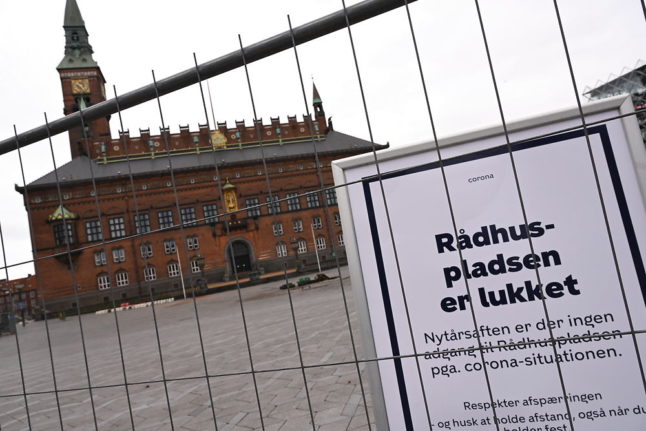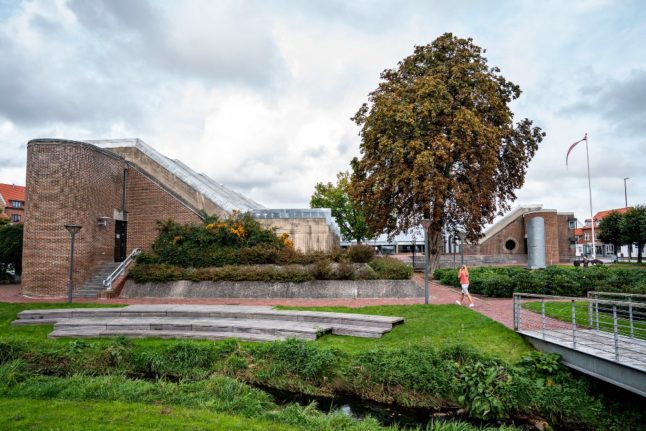In big cities like Copenhagen and Aarhus, December 31st normally sees throngs of partygoers filling the streets and setting off salvos of fireworks – a custom not universally popular.
Meanwhile, close friends often gather to follow time-honoured – and sometimes rather bizarre – traditions.
Although some of the pillars of a Danish New Year should withstand 2020’s Covid-19 onslaught, many will have to be adapted or cancelled this year.
‘Cancel New Year’s party plans’: prime minister
Earlier this week, amid surging coronavirus hospitalisations (Denmark has 926 Covid-19 inpatients at the time of writing), the government announced an extension of the current national lockdown until January 17th.
No new restrictions will be brought in for New Year's Eve, but the current rules limit public gatherings to 10 people and health authorities have strongly encouraged the public not to see more than the same 10 people socially.
READ ALSO: Denmark extends lockdown by two weeks
At a briefing, Prime Minister Mette Frederiksen urged people across the country to cancel plans to celebrate New Year’s Eve.
“In our eyes, it makes no sense for the New Year celebrations to mean that even more infection is spread,” she said, asking people to consider cancelling events they have organised.
Søren Brostrøm, director of the Danish Health Authority, called on people to cancel any New Year's Eve events planned with anyone they did not see normally, “and consider going home early and early to bed,” he added.
Denmark's national police chief, Thorkild Fogde, said that police would be out in large numbers on New Year's Eve to enforce the ban on gatherings of more than ten people.
Central Copenhagen square to be closed, more police elsewhere
Police will shut Rådhuspladsen, the traditional centre of the country's celebrations, for New Years' Eve to prevent revellers from gathering.
READ ALSO: Police to close off Copenhagen's main square on New Year's Eve
“This year, we won't only be keeping distance from the fireworks, but also from one another,” Jørgen Bergen Skov, the chief of police in Copenhagen, said in a press release.
The square will be fully closed from 4pm on December 31st until 9.30am on January 1st.
Aarhus will not close off any outside public areas including the central square, but has confirmed extra police officers will be on patrol to enforce assembly limits in place due to the coronavirus. Denmark currently limits public gatherings to 10 people.
The Queen's speech
Some of the most-loved Danish New Year’s Eve celebrations can still be enjoyed this year, as they take place in the comfort of your own home. The most important of these is arguably the Queen’s speech.
Queen Margrethe’s annual message often touches on ethical and cultural topics, as well as the need for solidarity in society. The Queen also customarily takes time to thank Danish servicemen based abroad.
There will be no prizes for guessing the main topic of the Queen’s New Year speech in 2020, and it won’t even be the first time this year she has addressed the public on television over the matter.
In March, she gave a rare address over a specific issue, telling her subjects that attending gatherings would be both “inconsiderate” and “reckless” and could lead to the deaths of loved ones due to the arrival of the pandemic in Denmark.
“Right now we have to show our togetherness by keeping apart,” Queen Margrethe said on March 17th, adding that “sadly, not everyone is treating the situation with the gravity that it calls for.”
READ ALSO: Denmark's Queen appeals to Danes to keep apart in coronavirus address
Whatever she chooses to say this evening, you can be sure that once she signs off the 6pm speech with her famous “God save Denmark” (Gud bevare Danmark) line, people across the country will sit down to enjoy lovingly-prepared New Year’s Eve meals.
The 90th Birthday
Also known as Dinner for One, this ancient black-and-white comedy sketch is shown year after year in Danish homes as the old year ticks to a close.
No matter what else you do on New Year's Eve in Denmark, there is one thing nearly everyone shares: an 11-minute television interlude to watch 'Dinner for One'. Virtually unknown in the rest of the world, the British-made skit from 1963 is loved in Germany and Scandinavia – not least in Denmark and Sweden.
The popular catchphrases: “The same procedure as last year, Miss Sophie?” – “The same procedure as every year, James!” might ring a little different this year. But the light humour and sense of familiarity could be an apt way to see off a year few will look back on fondly, while hoping for the return of better times in 2021.
READ ALSO:
- How to celebrate New Year's Eve Danish style (2019)
- Why does Denmark go so crazy for New Year's Eve fireworks?



 Please whitelist us to continue reading.
Please whitelist us to continue reading.
Member comments